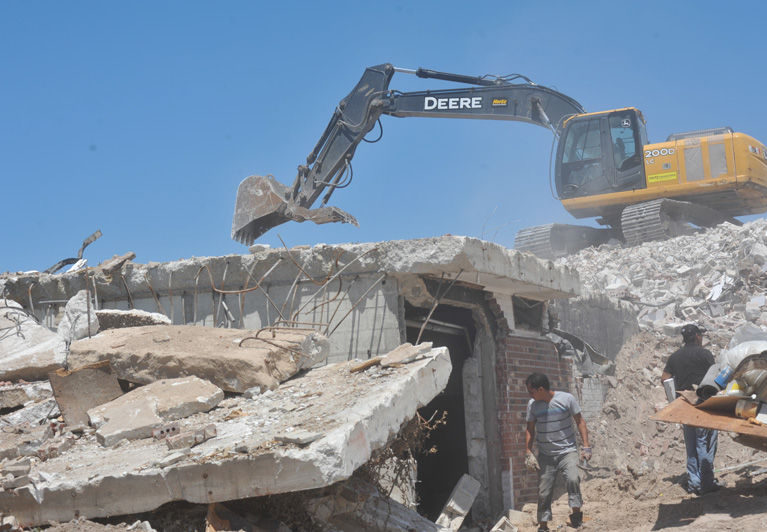
VERO BEACH — Demolition of the former Surf Club hotel was temporarily put on hold last week after residents in the Bethel Creek neighborhood and people driving by on Highway A1A complained about excessive dust clouds.
“We received many complaints about the dust,” said Vero Beach Police Public Information Officer Anna Carden. “People were quite concerned and we took the complaints seriously.”
On Thursday, Code Enforcement Officer Melody Sanderson went to the site on A1A north of Jaycee Park and witnessed a cloud of dust blowing across the road from the demolition site.
“She could see it was a big issue,” said Carden.
Sanderson issued a warning citation for a violation of the Florida Standard Building Code, which has been adopted by the City of Vero Beach. It requires demolition dust and debris to be controlled “to ensure that no dust is transmitted to neighboring properties or streets.”
Later that day, when Sanderson went by the location again, the dust cloud was still visible.
At that point, she contacted the main office of the demolition contractor, Cross Environmental Services, in Crystal Springs, Fla., and reached out to local developers Vic Lombardi and Clark French.
The developers, who bought the 2.56-acre hotel property in March for $7.95 million and plan to build 11 luxury townhomes on the site, consulted with the city and the demolition contractor and decided to shut the project down on Friday and over the weekend to allow time for implementation of a better dust mitigation plan.
Cross Environmental had already installed fabric silt fencing along A1A to contain debris and was watering the rubble to reduce dust as the building was knocked down and large pieces of concrete were broken into small pieces for recycling.
The problem, according to French, was inadequate water.
“This is one of the biggest demolition projects the city has seen in years, and the water main on the site is not as large as we would like,” French said on Saturday. “The city said we need more water on the debris so we are going to split the water main to allow for better water distribution to better suppress the dust. The demolition contractor will also be putting up more silt fencing.”
Work resumed at the site Monday and Lombardi said he thought the splitter and additional fencing had been installed, though he said he had not been able to get in touch with Cross Environmental’s project manager to confirm that.
Lombardi expects that the demolition, which he says is costing the developers approximately $500,000, will be complete sometime in mid-June.
Carden said if the dust problem persists, the next step would be a citation with a fine attached.
Built in 1972, the 70,000-square-foot, 108-room hotel was purchased in 1986 for $3.2 million by Jon Bates, who sold the property to Lombardi and French.
During the real estate boom, the property was listed for sale for as much as $24 million, but there were no takers.
Despite its superb location, the hotel, at one point a Best Western and later called the Vero Beach Inn before becoming the Surf Club, struggled over the years and was classified as an economy/limited service property by Loopnet.com, a commercial real estate information website.
Bates leased the property in 2009 to Palm Beach Hotelier Jim Clarke who had plans to revitalize and upgrade it.
Clarke spent an undisclosed amount of money on a cosmetic makeover but never completed the upgrade and pulled out a year later, dumping the property back into Bates’ hands.
A number of potential buyers have looked at the property in recent years, most with the idea of restoring and upgrading the hotel, but Lombardi and French saw a different possibility.
“There comes a time when a building is functionally obsolete,” French said at the time of the sale. “There is only so much you can do with new carpet and drapes.”
Tearing the old structure down and building a new hotel did not make sense, either.
When Bates bought the property in 1986 it included a 1-acre lot on the opposite side of A1A that he sold for $2 million in 2008, reducing the size of the parcel to 2.56 acres.
“With the loss of that land and current building codes that have been revised since the hotel was built, you would only be allowed 28 or maybe 32 rooms in a replacement hotel, and that might not have been economically viable,” French said.
The townhomes, on the other hand, seem like a winning proposition. There are very few new homes or homebuilding opportunities available on Vero’s oceanfront and Lombardi says demand for similar homes at East End, a project he built in Central Beach in 2014, far exceeded the supply.
French expects completion of planning, design and permitting for the Surf Club project to take another six months or so, with construction starting near the end of the year.



